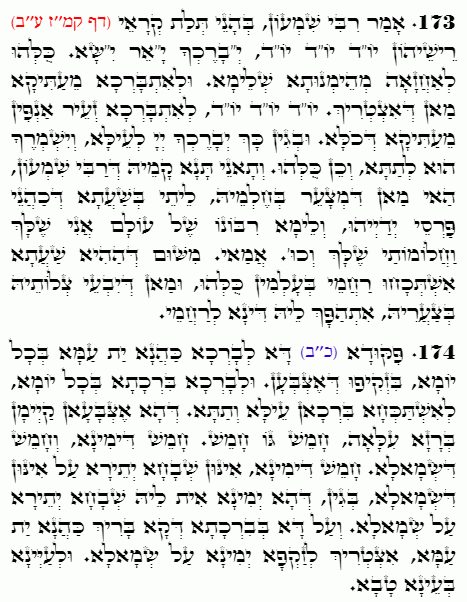Daily Zohar # 4580 – Naso – The conditions needed to bless others
Daily Zohar 4580

Hebrew translation:
174. מִצְוָה (כ”ב) זוֹ לְבָרֵךְ הַכֹּהֵן אֶת הָעָם בְּכָל יוֹם בִּזְקִיפוּת הָאֶצְבָּעוֹת, וּלְבָרֵךְ בְּרָכָה בְּכָל יוֹם, לְהִמָּצֵא בְרָכוֹת מַעְלָה וּמַטָּה. שֶׁהֲרֵי הָאֶצְבָּעוֹת עוֹמְדוֹת בְּסוֹד עֶלְיוֹן, חָמֵשׁ תּוֹךְ חָמֵשׁ. חָמֵשׁ שֶׁל הַיָּמִין וְחָמֵשׁ שֶׁל שְׂמֹאל. חָמֵשׁ שֶׁל הַיָּמִין הֵן שֶׁבַח יוֹתֵר עַל אוֹתָן שֶׁל שְׂמֹאל, מִשּׁוּם שֶׁיָּמִין זוֹ יֵשׁ לָהּ שֶׁבַח יָתֵר עַל שְׂמֹאל. וְעַל זֶה בַּבְּרָכָה שֶׁמְּבָרֵךְ הַכֹּהֵן אֶת הָעָם, צָרִיךְ לִזְקֹף יָמִין עַל שְׂמֹאל וּלְעַיֵּן בְּעַיִן טוֹבָה.
.
Zohar Naso
Continued from previous DZ
#173
Rabbi Shimon said, “In these three verses, at their beginning, there are three yuds: the yud of ‘יברכך’ (May He bless you), the yud of ‘יאר’ (May He illuminate your face), and the yud of ‘ישא’ (May He lift up His countenance). All of these point to the complete faith and that the blessing comes from Atika, which is the yud of the YHVH, for the one who needs to be blessed. Three yuds, three times, indicate that Zeir Anpin is blessed from Atika. The three yuds correspond to the three lines: ‘יברכך’ is the right line, ‘יאר’ is the left line, and ‘ישא’ is the middle line. Therefore, ‘יברכך ה׳’ is above, to Zeir Anpin, that he may receive from Atika, and ‘וישמרך’ is below, for Israel.”
A Tanna taught before Rabbi Shimon: “Anyone who is distressed by a dream should come at the time when the Kohanim spread their hands for the Priestly Blessing and say, ‘Master of the Universe, I am Yours, and my dreams are Yours, etc.’ Why? Because at that time, mercy is present in all worlds, and whoever prays about their distress, their judgment will be transformed into mercy.”
#174
This precept for the priest to bless the people every day with the raising of the fingers, so that blessings may be found both above and below. The fingers are arranged according to a supernal secret: five within five, five on the right, and five on the left. The five on the right have greater significance than those on the left because the right side is more important than the left. Therefore, in the blessing the priest gives the people, he should raise the right hand above the left. He should also bestow the blessings with “בְּעַיִן טוֹבָה,” a good eye (a kindhearted intention).
Lesson;
This teaching underscores the significance of the Priestly Blessing as a powerful moment for invoking Hashem’s mercy. When the priests raise their hands to bless the people, it creates an auspicious time when mercy permeates the cosmos. This is an ideal moment for individuals to seek relief from their troubles, particularly from distressing dreams. By turning to God and acknowledging His sovereignty over their lives and dreams, they align themselves with the flow of mercy to the world, allowing their adverse judgments to be transformed into compassionate outcomes. This practice highlights the deep connection between ritual, timing, and the efficacy of prayer in Jewish spiritual tradition.
Proverbs 22:9 states: “טוֹב עַיִן הוּא יְבֹרָךְ כִּי נָתַן מִלַּחְמוֹ לַדָּל.” “He who has a generous (good) eye will be blessed, For he gives of his bread to the poor.”
The Zohar (Achare Mot #124) adds another interpretation to this verse differently, suggesting that instead of reading “will be blessed,” we should read “will bless,” implying that a person with a “Good eye” (עַיִן טוֹבָה), like the priests, can bless the people.
The Priestly Blessing must be adequately performed. The act of raising the fingers symbolizes the connection to the ten sefirot. The right hand’s precedence over the left highlights the importance of Chassadim (kindness) and mercy from the right over judgment from the left. The priest must not only perform the ritual correctly but also maintain a pure meditation of love and peace, ensuring that the blessings are genuinely beneficial for the people.
The concept of “בְּעַיִן טוֹבָה” (“a good eye”) is crucial. Proverbs 22:9 emphasizes the importance of a generous eye, stating that a person with such an eye is blessed because he shares his bread with the poor. The Zohar expands on this idea, suggesting that a person with a “good eye” not only receives blessings but is also empowered to bless others. This aligns with the role of the priests, who bless the people with a good and generous eye.
Before the priests raise their hands, they recite the blessing:
“בָּרוּךְ אַתָּה ה’ אֱלֹהֵינוּ מֶלֶך הָעוֹלָם אֲשֶׁר קִדְּשָׁנוּ בִּקְדֻשָּׁתוֹ שֶׁל אַהֲרֹן וְצִוָּנוּ לְבָרֵךְ אֶת עַמּוֹ יִשְׂרָאֵל בְּאַהֲבָה”
“Blessed are You, Lord our God, King of the Universe, who has sanctified us with the sanctity of Aaron and commanded us to bless His people Israel with love.”
‘Eye’ (‘עין’) has a numerical value of 130, which is ten times the value of ‘love’ (‘אהבה’), emphasizing the deep connection between vision and love. Each finger that the priest raises during the blessing is illuminated with love, reinforcing the powerful, benevolent energy of the blessing. This connection ensures that the blessings invoked by the priest are filled with compassion and kindness, reflecting the divine attributes they aim to channel.
Thus, the act of blessing with love and “good eye” signifies more than just a ritual; it embodies the priest’s love, generosity, and the divine mercy that flows through them, transforming the act into a profound spiritual experience that benefits all who receive it.
{||}

 Previous: Naso
Previous: Naso

